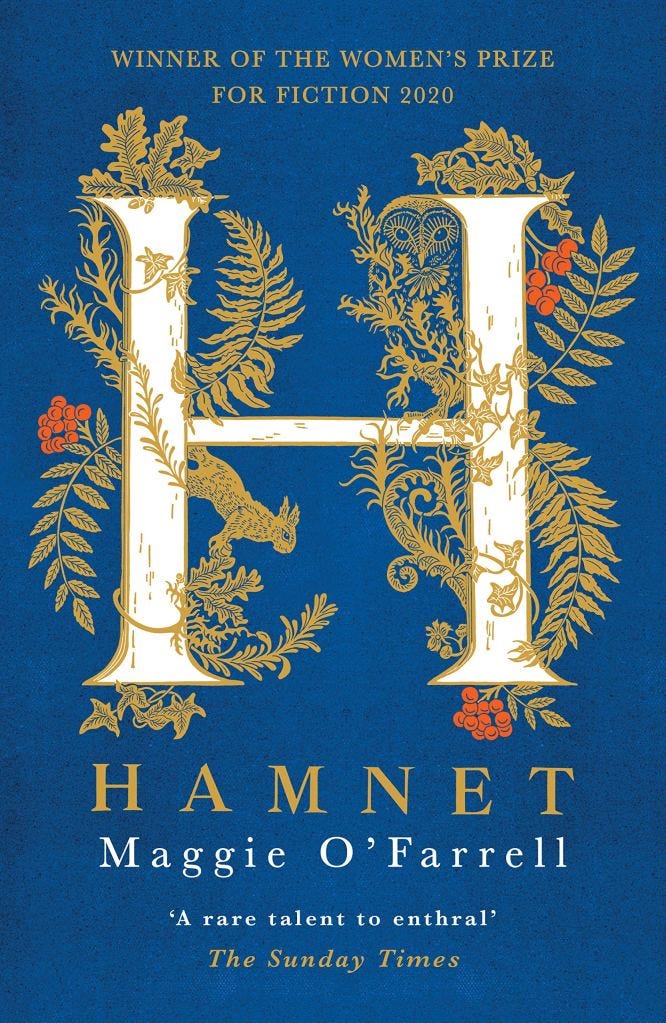Hamnet by Maggie O'Farrell
Hamnet
Author: Maggie O’Farrell
Genre: Literary Fiction / Historical Fiction / Magical Realism
Date: 12 September 2021
Rating: 4 stars
Review: This year’s Women’s Prize for Fiction was announced this week, Susanna Clarke’s Piranesi. Did I then pick up the book and start reading it? Nah! I went ahead and read last year’s winner. It might have something to do with the fact that Susanna Clarke’s previous book is still sitting on my shelves 5 years after I bought it and I haven’t been able to finish it… but I’m not going to admit to anything.
Despite being the winner of the Women’s Prize for Fiction 2020, this book has a lot of mixed reviews. For about the first 35-40 pages of the book I was enthusiastically agreeing with all the critics. There is too much description. The characters do seem flat. Nothing happens in the plot. I was scared that another book would lie on my shelf. I don’t have place for the new ones, I cannot possible spare space for books I don’t like but I hope one day I’ll like. I’m not saying I am talking about Jonathan Strange and Mr Norrell but I’m not not talking about it. And then at around page 45 the book sucked me into this world of 1580s Warwickshire and I emerged at the end of the book having been lost in O’Farrell’s writing. Believe me, no one was as surprised as I was.
William Shakespeare, does he need an introduction, had three children with his wife: Susanna (this name just keeps popping up in this review) and the twins, Judith and Hamnet. This book tells the story of young, 11-year-old Hamnet and how he lost his life to the pestilence or plague. But to say the story is about William Shakespeare’s son would be reductive. Actually, Shakespeare is never named in the book. He is Hamnet father, Mary’s son or Agnes’ husband, but never explicitly called William and I think that was what made the story that much better. The book chronicles Agnes’ life with her husband, how they fell in love and how she was the person who pushed him to go to London, where he went on to write a few plays. It is about the grief of losing a child, of losing a twin. It is the story of a child’s conviction and determination to protect his sister. And yes, it is also about the circumstances that brings a man to write a play a year after the death of his son which shares a name with his son. I mean there could be worse tributes but I’m sure there could be better.
A few reviews ago I remember mentioning that reading One Hundred Years of Solitude is like having a fever dream, this book almost met those standards. It is dreamy in its depiction of this world. There is an element of magical realism that is woven into the story seamlessly and I think that is what changed my opinion of the book. For me, Agnes was the star of this book. Her instincts, her ability to figure out things about people they are not aware about and consequently her relationship with her husband is what made this book for me.
The parts of the book that really stood out to me were the scenes around Agnes’ pregnancy and labour. Another section of the book had to be the exploration of grief. It was poignant. Hamnet’s death itself is written quickly, its almost like O’Farrell skips over the exact moment of death. For a book to not write about the very thing it is about may come off as strange but in its portrayal of everything that happens after the death from preparing the body to actually burying the child we realise just how much of the story is about this family’s loss. But by far my favourite part of this book would be how the disease reached Judith and then Hamnet. It is a collection of montage-like scenes, which would translate beautifully to film, that chronicles the journey of the fleas that would eventually lead to the death of this child in Warwickshire. I haven’t been engaged by a chapter, disjointed from the rest of the story, so much in any other book.
Then there is the description of Hamlet. Once again the play is not mentioned by name and neither is the playwright but you know what is being described. You are transported along with Agnes into this world of the theatre where everything is larger than life and where it is difficult to distinguish between reality and fiction. You are questioning the playwright’s motives behind naming the play after the son he lost so recently. And then you are right there when you reach the same conclusion as Agnes. Only a good writer can take you on the same journey as the characters and make you feel the same emotions.
O’Farrell’s writing is beautiful. It is descriptive, something I don’t normally gel with, but this time it paid off. Every page is filled with shocks to the senses, you can see the colour of the flowers that Agnes grows, you can taste the sweet plums, you can smell the roasted goose and hear the buzzing bees. I wouldn’t want to live in the 1580’s for even a second but this book gave a taste of what it would be like.
But, oh god, Agnes! I love her and she is by far one of the most memorable characters!

